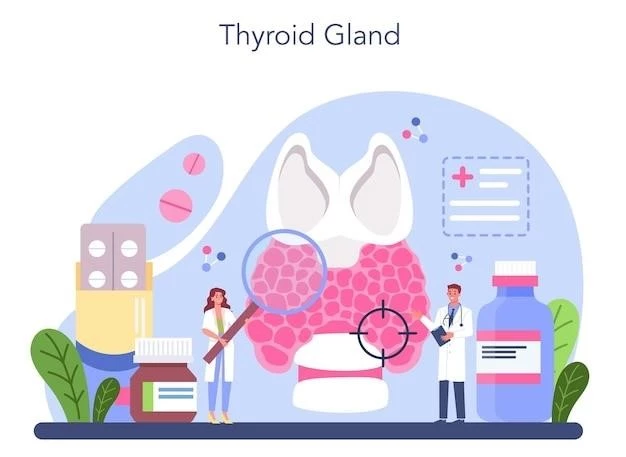Introduction
Thyroid cancer originates in the thyroid gland and includes main types like papillary and follicular.
Thyroid cancer develops in the thyroid gland, with main types being papillary, follicular, medullary, and anaplastic. Papillary is the most common type. Common symptoms include neck and throat pain, while diagnosis and treatment involve various methods such as surgery, radioactive iodine, and hormone therapy.
Types of Thyroid Cancer
Thyroid cancer has four main types⁚ papillary, follicular, medullary, and anaplastic; papillary being the most common.
Main Types
Thyroid cancer primarily consists of four main types⁚ papillary, follicular, medullary, and anaplastic. Papillary thyroid cancer is the most prevalent form among them.
Rare Types
While papillary and follicular are common, medullary and anaplastic are rare types of thyroid cancer. Anaplastic thyroid cancer, in particular, is known for being aggressive and challenging to treat.
Overview of Thyroid Cancer
Thyroid cancer develops in the thyroid gland, with main types being papillary, follicular, medullary, and anaplastic. Papillary is the most common type. Common symptoms include neck and throat pain, while diagnosis and treatment involve various methods such as surgery, radioactive iodine, and hormone therapy.
Common symptoms of thyroid cancer include neck and throat pain, difficulty swallowing, hoarseness, and the presence of a lump.
Diagnostic Procedures
Diagnosis of thyroid cancer involves various procedures such as ultrasound, biopsy, blood tests, and imaging scans like CT or MRI to confirm the presence of cancer cells and determine the extent of the disease.

Causes and Risk Factors
Thyroid cancer has various possible causes and risk factors, such as exposure to radiation and genetic predisposition.
Possible Causes
Thyroid cancer may be caused by factors such as exposure to radiation, iodine deficiency, genetic mutations, and certain inherited genetic syndromes.
Risk Factors
Risk factors for thyroid cancer include exposure to radiation, family history of the disease, and certain inherited genetic conditions.
Common Symptoms
Common symptoms of thyroid cancer include neck and throat pain, difficulty swallowing, hoarseness, and the presence of a lump.
Surgery
Surgery is a common treatment option for thyroid cancer, involving the removal of part or all of the thyroid gland to eliminate cancerous cells.
Radiation Therapy
Radiation therapy is a common treatment for thyroid cancer, using high-energy radiation to destroy cancer cells and prevent their growth and spread.
Chemotherapy
Chemotherapy is sometimes used in the treatment of thyroid cancer, particularly for aggressive or advanced cases where surgical or radiation options may not be sufficient.
Hormone Therapy
Hormone therapy is utilized in treating thyroid cancer to regulate hormone levels and inhibit the growth of cancer cells that may respond to hormones.
Thyroid cancer has a high 5-year survival rate, with most cases being treatable and having a good prognosis.
Thyroid cancer has a high 5-year survival rate, with most cases being treatable and having a good prognosis.
5-Year Survival Rate
Thyroid cancer has a high 5-year survival rate٫ with most cases being treatable and having a good prognosis.

Prevention and Awareness
Preventive measures for thyroid cancer include avoiding exposure to radiation and genetic counseling for high-risk individuals.
Preventive Measures
Preventive measures for thyroid cancer include avoiding exposure to radiation, maintaining a diet rich in iodine, and regular screenings for early detection.
Importance of Early Detection
Early detection of thyroid cancer is crucial for effective treatment and improved outcomes, highlighting the significance of regular screenings and prompt medical attention.
Ongoing Research and Developments
Advancements in diagnosing and treating thyroid cancer aim to improve outcomes for patients.
Current Studies
Ongoing research in thyroid cancer includes studies on new treatment approaches, clinical trials testing innovative therapies, and investigations into genetic factors influencing the disease’s development and progression.
New Treatment Approaches
Ongoing research in thyroid cancer explores innovative treatment approaches, including targeted therapy and immunotherapy to improve patient outcomes and quality of life.
Patient Support Groups
There are various patient support groups that offer guidance, emotional support, and resources for individuals dealing with thyroid cancer.
Online resources for thyroid cancer provide valuable information, forums, and tools for patients and their families to navigate the journey effectively.
Online Resources
Online resources for thyroid cancer provide valuable information, forums, and tools for patients and their families to navigate the journey effectively.
Physical Effects
Thyroid cancer can impact physical well-being, leading to changes in energy levels, weight, and overall health.
Emotional Well-being
Thyroid cancer can impact emotional well-being, leading to anxiety, stress, and emotional challenges for patients and their families.
Counseling and Therapy
Counseling and therapy play a crucial role in addressing the emotional impact of thyroid cancer diagnosis and treatment, providing support and coping strategies for patients.
Adopting healthy lifestyle habits such as regular exercise, balanced diet, and stress management can help individuals cope with the challenges of thyroid cancer.
Lifestyle Changes
To cope with the challenges of thyroid cancer, individuals can adopt healthier habits like regular exercise, balanced diet, and stress management.
Coping Strategies
Counseling and therapy can help individuals navigate the emotional challenges of thyroid cancer diagnosis and treatment, providing support and coping strategies.
Inspiring Journeys
Survivor stories of individuals who have navigated the challenges of thyroid cancer can inspire and provide hope to others facing similar battles.
Challenges Faced
Survivors of thyroid cancer often face challenges, both physical and emotional, which can impact their daily lives and well-being.
Survivor Stories
Survivor stories of individuals who have overcome thyroid cancer can shed light on the challenges faced and inspire others in their journey.
Incidence Rates
Thyroid cancer is among the most commonly diagnosed cancers, with incidence rates showing a notable increase in recent years.
Thyroid cancer incidence rates vary globally, with certain regions showing higher prevalence and increased diagnoses over recent years.
Regional Variances
Thyroid cancer incidence rates vary globally, with some regions showing higher prevalence and increased diagnoses in recent years due to various factors.
In conclusion, understanding the prevalence, symptoms, and treatment options for thyroid cancer is essential for comprehensive care.
Final Thoughts on Thyroid Cancer
In conclusion, understanding the prevalence, risk factors, and available treatments for thyroid cancer is crucial in improving patient outcomes and quality of life.
